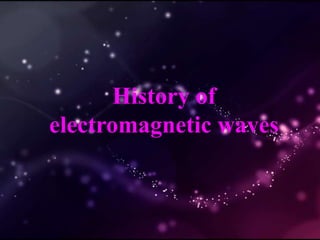History of electromagnetic wave’s discovery
•Descargar como PPTX, PDF•
36 recomendaciones•54,547 vistas
Perhaps the greatest theoretical achievement of physics in the 19th century was the discovery of electromagnetic waves.
Denunciar
Compartir
Denunciar
Compartir

Recomendados
Grade 10 Science Quarter 1 Module 1

Grade 10 Science Quarter 1 Module 1Eusebio Lopez Memorial Integrated School (Department of Education)
Más contenido relacionado
La actualidad más candente
Grade 10 Science Quarter 1 Module 1

Grade 10 Science Quarter 1 Module 1Eusebio Lopez Memorial Integrated School (Department of Education)
La actualidad más candente (20)
PLATE TECTONICS(GRADE10SCIENCE 1STQUARTER MODULE1)

PLATE TECTONICS(GRADE10SCIENCE 1STQUARTER MODULE1)
Grade 10 Earth Science 1st quater : Plate tectonics

Grade 10 Earth Science 1st quater : Plate tectonics
Reflection of Light in Mirrors - Science 10 (S10FE-IIg-h-50-52)

Reflection of Light in Mirrors - Science 10 (S10FE-IIg-h-50-52)
Uniformly accelerated motion (free fall) problems and solutions

Uniformly accelerated motion (free fall) problems and solutions
Destacado (20)
EM spectrum applications, Electromagnetic Wave Theory

EM spectrum applications, Electromagnetic Wave Theory
Similar a History of electromagnetic wave’s discovery
Similar a History of electromagnetic wave’s discovery (20)
The historical development of the concept of forces

The historical development of the concept of forces
LECTURE 14 ATOMIC STRUCTURE ELECTRONS, PROTONS and NEUTRONS.docx

LECTURE 14 ATOMIC STRUCTURE ELECTRONS, PROTONS and NEUTRONS.docx
Más de Bleona Çoba
Más de Bleona Çoba (10)
Último
TỔNG ÔN TẬP THI VÀO LỚP 10 MÔN TIẾNG ANH NĂM HỌC 2023 - 2024 CÓ ĐÁP ÁN (NGỮ Â...

TỔNG ÔN TẬP THI VÀO LỚP 10 MÔN TIẾNG ANH NĂM HỌC 2023 - 2024 CÓ ĐÁP ÁN (NGỮ Â...Nguyen Thanh Tu Collection
Mehran University Newsletter Vol-X, Issue-I, 2024

Mehran University Newsletter Vol-X, Issue-I, 2024Mehran University of Engineering & Technology, Jamshoro
Último (20)
TỔNG ÔN TẬP THI VÀO LỚP 10 MÔN TIẾNG ANH NĂM HỌC 2023 - 2024 CÓ ĐÁP ÁN (NGỮ Â...

TỔNG ÔN TẬP THI VÀO LỚP 10 MÔN TIẾNG ANH NĂM HỌC 2023 - 2024 CÓ ĐÁP ÁN (NGỮ Â...
Unit 3 Emotional Intelligence and Spiritual Intelligence.pdf

Unit 3 Emotional Intelligence and Spiritual Intelligence.pdf
Plant propagation: Sexual and Asexual propapagation.pptx

Plant propagation: Sexual and Asexual propapagation.pptx
Beyond_Borders_Understanding_Anime_and_Manga_Fandom_A_Comprehensive_Audience_...

Beyond_Borders_Understanding_Anime_and_Manga_Fandom_A_Comprehensive_Audience_...
Food safety_Challenges food safety laboratories_.pdf

Food safety_Challenges food safety laboratories_.pdf
UGC NET Paper 1 Mathematical Reasoning & Aptitude.pdf

UGC NET Paper 1 Mathematical Reasoning & Aptitude.pdf
Kodo Millet PPT made by Ghanshyam bairwa college of Agriculture kumher bhara...

Kodo Millet PPT made by Ghanshyam bairwa college of Agriculture kumher bhara...
HMCS Vancouver Pre-Deployment Brief - May 2024 (Web Version).pptx

HMCS Vancouver Pre-Deployment Brief - May 2024 (Web Version).pptx
21st_Century_Skills_Framework_Final_Presentation_2.pptx

21st_Century_Skills_Framework_Final_Presentation_2.pptx
History of electromagnetic wave’s discovery
- 2. Perhaps the greatest theoretical achievement of physics in the 19th century was the discovery of electromagnetic waves. The first hint was an unexpected connection between electric phenomena and the velocity of light.
- 3. About 150 years ago, James Clerk Maxwell, an English scientist, developed a scientific theory to explain electromagnetic waves. He noticed that electrical fields and magnetic fields can couple together to form electromagnetic waves. Neither an electrical field (like the static which forms when you rub your feet on a carpet), nor a magnetic field (like the one that holds a magnet onto your refrigerator) will go anywhere by themselves. But, Maxwell discovered that a CHANGING magnetic field will induce a CHANGING electric field and vice-versa. An electromagnetic wave exists when the changing magnetic field causes a changing electric field, which then causes another changing magnetic field, and so on forever. Unlike a STATIC field, a wave cannot exist unless it is moving. Once created, an electromagnetic wave will continue on forever unless it is absorbed by matter.
- 6. Guglielmo Maconi After Maxwell and Hertz, the next physicist who continued with the discovery of more developed magnetic waves, was Guglielmo Marconi. The Italian physicist began his experiments when he was barely 20, building on Heinrich Hertz's discovery of radio waves in 1888. In 1895 Marconi transmitted recognizable electronic signals from his family home in Pontecchio to a vertical raised antenna more than a mile away. As radio transmission of telegraph messages and, later, spoken words became more common and popular. Marconi also had the first transatlantic Morse code transmission from England to Newfoundland through electromagnetic waves.
- 8. Reginald Fessenden Fessenden's most notable achievements include the first audio radio transmission in 1900, the first two way transatlantic transmission in 1906 and the first broadcast of entertainment, also in 1906. Many of these were well ahead of their time, and showed his insight, not only into the technical aspects of radio, but also the commercial elements as well.
